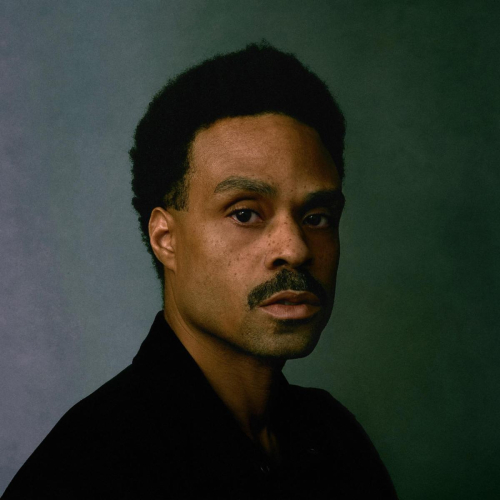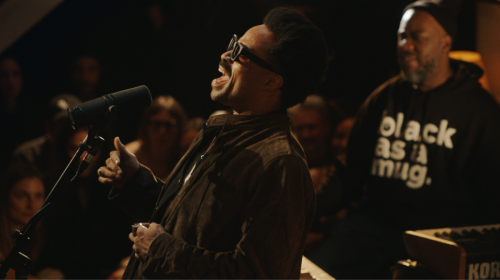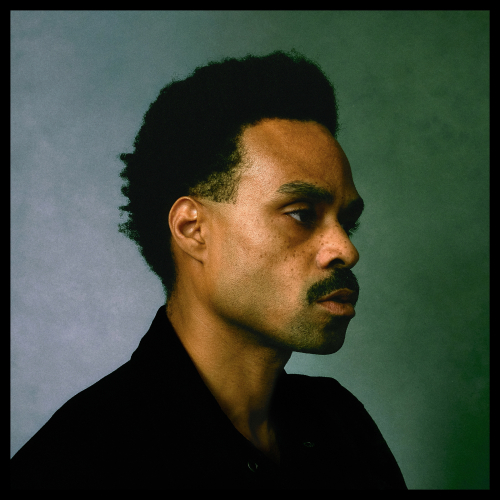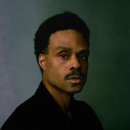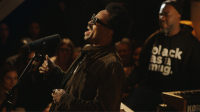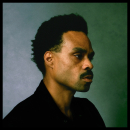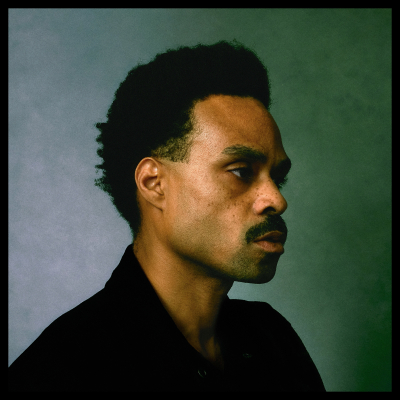Glasshaus Presents: Bilal
Click  on photo to download high resolution version
on photo to download high resolution version
All rights reserved. Photos are for editorial use only.
Photos
Videos
Latest ReleaseView All
Live at Glasshaus
Release date: 6.14.24
Label: Glasshaus Presents
Biography View
Glasshaus Presents: Bilal feat. Questlove, Common, Robert Glasper, and Burniss Travis | Live at Glasshaus
When considering his legacy ahead of the release of the stunningly rendered live record Live at Glasshaus, the GRAMMY Award-winning artist Bilal was candid and fiery: “I still have something to prove. I’m being preserved for a reason: the world needs to know this shit! Everything I do—music-wise, business-wise, packaging-wise—everything needs to be on point.”
More than twenty years into his storied career, the singer, songwriter and producer born Bilal Sayeed Oliver—who, after decades of accolades and A-list collaborations with likes of Kendrick Lamar, Beyonce, Jay-Z, Erykah Badu, Clipse, and so many more—is as locked in as ever.
Live at Glasshaus shines a spotlight on Bilal’s ever-evolving artistry that asserts, in 2024, that he is at the height of his powers, eternally honing his craft and finding new edges in his voice. It’s a historic performance by a superstar ensemble that rightfully affirms Bilal’s place as a G.O.A.T. deserving of our full attention.
The conceit for Bilal’s Live at Glasshaus is at once familial and musically poignant: present the beloved icon within an ensemble of luminaries––a who’s who from his still-thriving Soulquarian ecosystem of friends and collaborators from over two decades—to perform the icon’s repertoire in the titular space. The supergroup features Questlove on drums, Common on the mic, Robert Glasper on keys, and Burniss Travis on bass—all of them effusive about Bilal’s incomparable artistry.
“He's Beyonce's favorite singer,” Questlove says with reverence. “Let's just start there, you know what I mean? He's Jay-Z's favorite singer. Solange’s favorite singer. Real artists know a real artist when they see it. There's literally no person worth their grain of salt in terms of their talent that does not acknowledge his greatness. I compare people to Bilal. He's my standard for singing.”
Surrounded by an intimate studio audience of 100 fans, the project was recorded, filmed, and livestreamed from Glasshaus in Brooklyn, NY. With stripped-down arrangements and ecstatic performances, Bilal wove fresh interpretations of beloved favorites spanning 23 years of recorded output.
“The evening felt historic,” says Jarrett Wetherell, founder of Glasshaus Presents, who produced the live album and directed its concert film. “Everyone was floored. So many masters creating in an intimate space together makes for a special production. We’re honored to serve Bilal, an artist in the truest sense.”
Glasshaus Presents is the concert series with a film production studio and new record label that has curated quintessential performances by the likes of Kimbra, Baby Rose, Joan As Police Woman, Julius Rodriguez, Zé Ibarra, and Madison McFerrin, and yet this concert blew away all expectations for the intimate Brooklyn studio. On that fateful December 2nd, Bilal and his collaborators served up a generous and far-ranging exploration of choice cuts from an already classic body of work. Atop lithe and spacious arrangements that border on minimal, Bilal uncovers new strains of emotionality and impact in songs that have defined his unique legacy—and stakes his claim as one of the great vocalists of the modern era.
“I don’t listen to my own music unless I’m working on something,” explains Bilal. “When I return to these songs, I remember where they come from again and inject a new meaning into it that better reflects my voice and who I am now. The texture of my voice and the approach of all that has been a journey. My ears and how I perceive myself in music changes a lot.”
The setlist is golden: Nine songs stretched into fresh shapes and split up by interludes from Questlove and Common. There are the expected hits like “Soul Sista” and “Sometimes”, as well as the premiere of Bilal’s newest song “Humility”, but perhaps most special is the inclusion of two tracks from Love For Sale—Bilal’s lost early 2000s masterpiece shelved by Interscope after an untimely leak, which nevertheless went on to reach near-mythic status online. In revisiting these songs—the magisterial opener “Something To Hold” and a gloriously pyrrhic “All For Love”—Bilal reclaims the joy in artistic and professional horizons once-dashed.
“It's so great 20-something years later that we're here and supporting Bilal because he's always in our corner helping us, supporting us,” says Robert Glasper. “He's your favorite singer's favorite singer. The real ones know and he's fine with that and I'm fine with that.”
Throughout Live at Glasshaus, the interplay between Bilal and the band is alchemic. In their reimagining of Bilal’s debut hit, “Soul Sista,” the song’s pleas of devotion speak with the naked vulnerability of pillow talk as the band allows Bilal’s voice to quiver and yearn, building from hushed quiet to ecstatic crackle. The evening’s version of the Airtight’s Revenge track “Levels” feels cubist in the Thelonious Monk sense—Bilal is contemplative as Glasper plays cascading harmonies before the band breaks into a reverie of synthesizer squiggles, Questlove’s masterful rhythmic shifts, and Bilal’s pained, exasperated exhortations.
Bilal’s long-standing chemistry with Common, whom he affectionately refers to as “my big brother” onstage, is heartfelt throughout Common’s feature on “Reminisce”, his brilliant freestyles on “Sometimes” and “Humility”, as well as Bilal’s feature on the seminal Like Water For Chocolate standout, “Funky For You”.
In recalling these performances, Common describes Bilal’s unreal versatility: “One of the things I loved from the beginning is that you felt the gospel of Bilal, but you also felt the jazz of Bilal, and then you started feeling the soul singing of Bilal. All that got put in the pot and he came up with his unique sound.”
Bilal has always felt that the term neo-soul was reductive—that the music he and his Soulquarian compatriots were creating was more so a logical extension of jazz. Appropriately, the performances on Live at Glasshaus surge with jazz’s improvisatory verve and sense of possibility. “In performing my music, I’m used to big ensembles,” says Bilal, “and this performance stripped it all down. I felt like a trumpet player on some Miles Davis shit. With the jazz sensibility, it allows you to be agile about taking direction on the spot. When I lay out, somebody else steps up, and I fill in from there.”
Bilal is steeped in jazz: As a child, he’d accompany his father to the legendary Philadelphia jazz club Zanzibar Blue and listen in on musicians while hiding in the coat check. As Bilal recounts: “The jazz inflections in my singing came from the internal holy war in my life—my mom was a Sunday school teacher and I was in the little kid choir. My dad was Muslim, and he didn’t like that I was in the church choir. So my dad took me to the jazz club because he wanted to culture me to some ‘real’ music.”
As Bilal continued to develop his voice, jazz had an indelible influence. “Performing jazz taught me to approach songs with space. The less you say, the more it intrigues the listener’s imagination—it allows them to reminisce and reflect on their own lives.” He recalls learning this lesson from none other than jazz vocal legend Betty Carter, during his time at the Philadelphia High School for the Creative and Performing Arts. As Bilal tells it: “In an auditorium in front of all my friends, I was scatting, trying to do all the licks and everything. But she cuts in and tells me essentially to shut up—that I was doing too much, that I needed to give the songs room to breathe. ‘People make love in the space.’ It was a jewel I’ve held with me forever.”
It’s that attention to nuance and relentless drive to subtly reinvent his style that allows Bilal to so vividly inhabit these songs. But despite the depth and care of these Glasshaus Presents performances, it’s Bilal’s let live and let it rip philosophy that instills a timeless energy into his music. It’s an approach inspired by his son’s own visual art practice. “He does these amazing pieces and then will cut them up and put them in the trash, and that’s it. Build and destroy—he’s in the moment, picking up that vibration, being used to do whatever it is and after it’s done it’s done.”
After saying this, he pauses, seemingly to reflect on his own streak of resolute independence and desire to confound expectations—the things that have helped Bilal shape his own definition of stardom. As Questlove elaborates: “He's just the most fearless human ever because he operates from his heart and he doesn't operate from his head. And we all need to more be on this level where our heart is not in our brains.”
As Common pinpoints, it’s this exact sentiment that makes Live at Glasshaus so vital: “Bilal is divinely gifted in a way that you won't be able to go to many places on this planet and find anybody who can do what he does. You won't find anybody like him because he has truly voiced his individualism in his art. This dude is somebody that will go down as one of the greatest.”
Online
- Official Site
- .(JavaScript must be enabled to view this email address)
- YouTube
- Bilal Facebook
- Bilal Instagram
- Bilal Twitter

